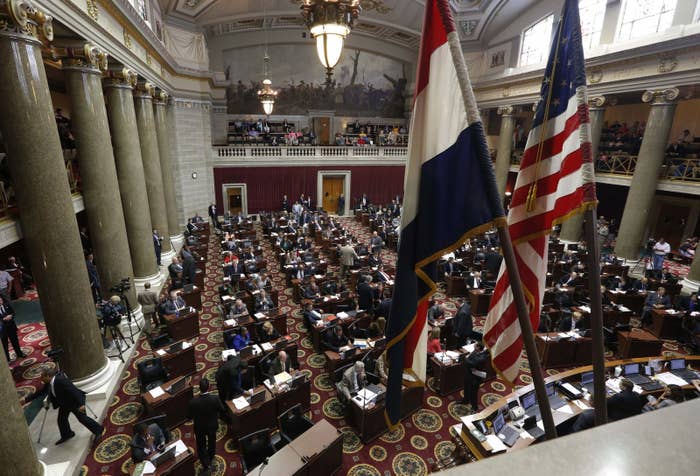
Just months after the Missouri House speaker resigned after it emerged he had been sexting with a 19-year-old intern, state lawmakers have been debating whether to introduce a dress code for interns — an idea that critics say is akin to victim-blaming.
Emails sent among representatives on Monday night discussing the intern dress code were leaked to the Kansas City Star newspaper. In the emails, Republican Rep. Bill Kidd suggested that an intern dress code would remove a distraction for lawmakers — an idea immediately criticized by Democrats as blaming victims of harassment.
"This is not the 1950s," Rep. Stacey Newman, a Democrat, wrote to her colleagues. "Harassment in the workplace is illegal, and a woman's attire does not give anyone the right to harass, regardless if they feel distracted.”
Sexual harassment in the state legislature has been making headlines since the resignation of Speaker John Diehl in May. Diehl was followed late last month by Sen. Paul LeVota stepping down amid accusations he had harassed interns.
According to the Kansas City Star, the email exchange began when a lawmaker tasked with restructuring the intern program sent out a draft document of suggested requirements for interns to colleagues for review. Kidd responded by suggesting a dress code be added to the document.

Kidd's suggestion was seconded by Republican Rep. Nick King, who reportedly wrote, "We need a good, modest, conservative dress code for both the males and females. Removing one more distraction will help everyone keep their focus on legislative matters.”
Democrats were quick to counter King's comments.
"We're really not going to require interns to dress so we're less distracted, are we?” said Democratic Rep. Bill Otto replied.
“If my plaid jacket or the sight of a woman's bare knee distracts you from your legislative duties, I would look for other work," wrote Rep. Jeremy LaFaver, also Democrat.
Another Democrat, Rep. Kip Kendrick, told his colleagues, “We should never infer that the problem -- and therefore its remedies -- lies with the student interns."
In letters to King and Kidd on Tuesday, U.S. Sen. Claire McCaskill of Missouri told the pair she was "bitterly disappointed."
"Is your recommendation meant to suggest," McCaskill wrote, "that if an intern wears suggestive clothing, she or he will share partial responsibility for any potential sexual harassment or assault?"
McCaskill has previously complained of widespread sexual harassment in the Missouri legislature during her time as a representative in the 1980s.
Contacted by BuzzFeed News on Tuesday, Kidd, who first suggested the inclusion of the dress code, said he was simply advocating for the importance of a professional dress code in the State Capitol and vehemently rejected the allegation that he had tried to blame victims.
"To think that they are responsible for anything that happened to them because of the way that they were dressed is ludicrous," Kidd said.
King did not return repeated requests for comment from BuzzFeed News, but told local station KCTV5 on Tuesday evening that "modesty is always the best policy."
"Having a modest dress code, something that is going to eliminate any temptations to look further or harder on either, male to female, female to male, just makes a lot of sense," King said.
